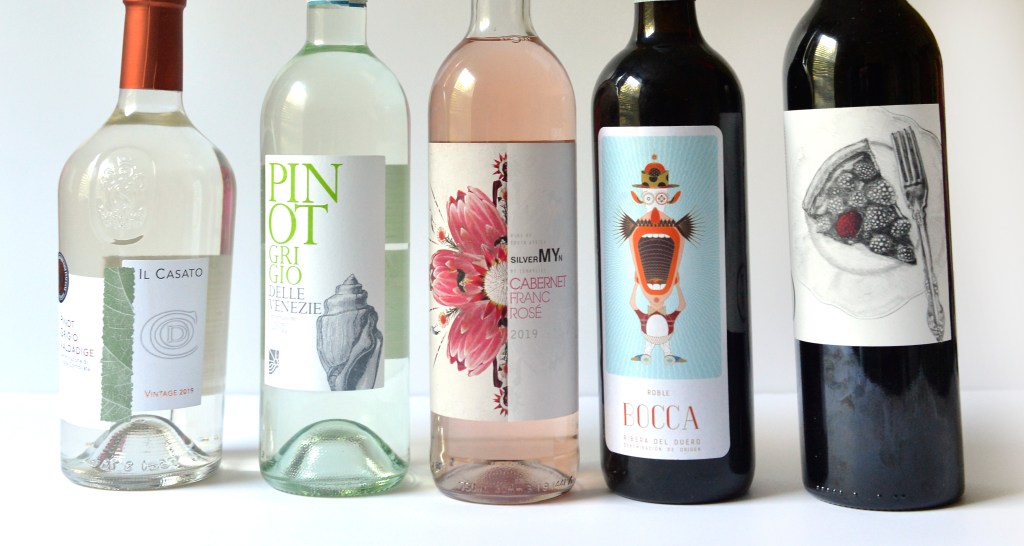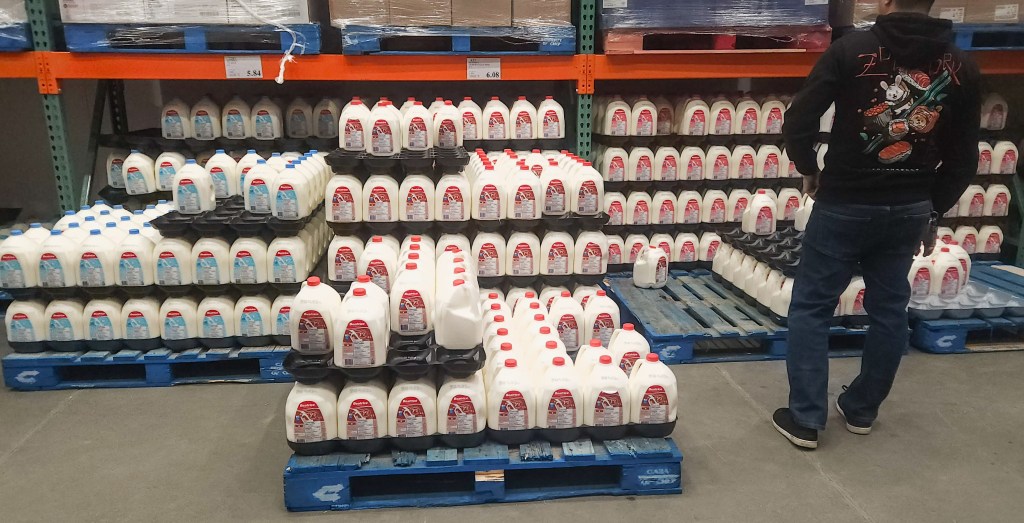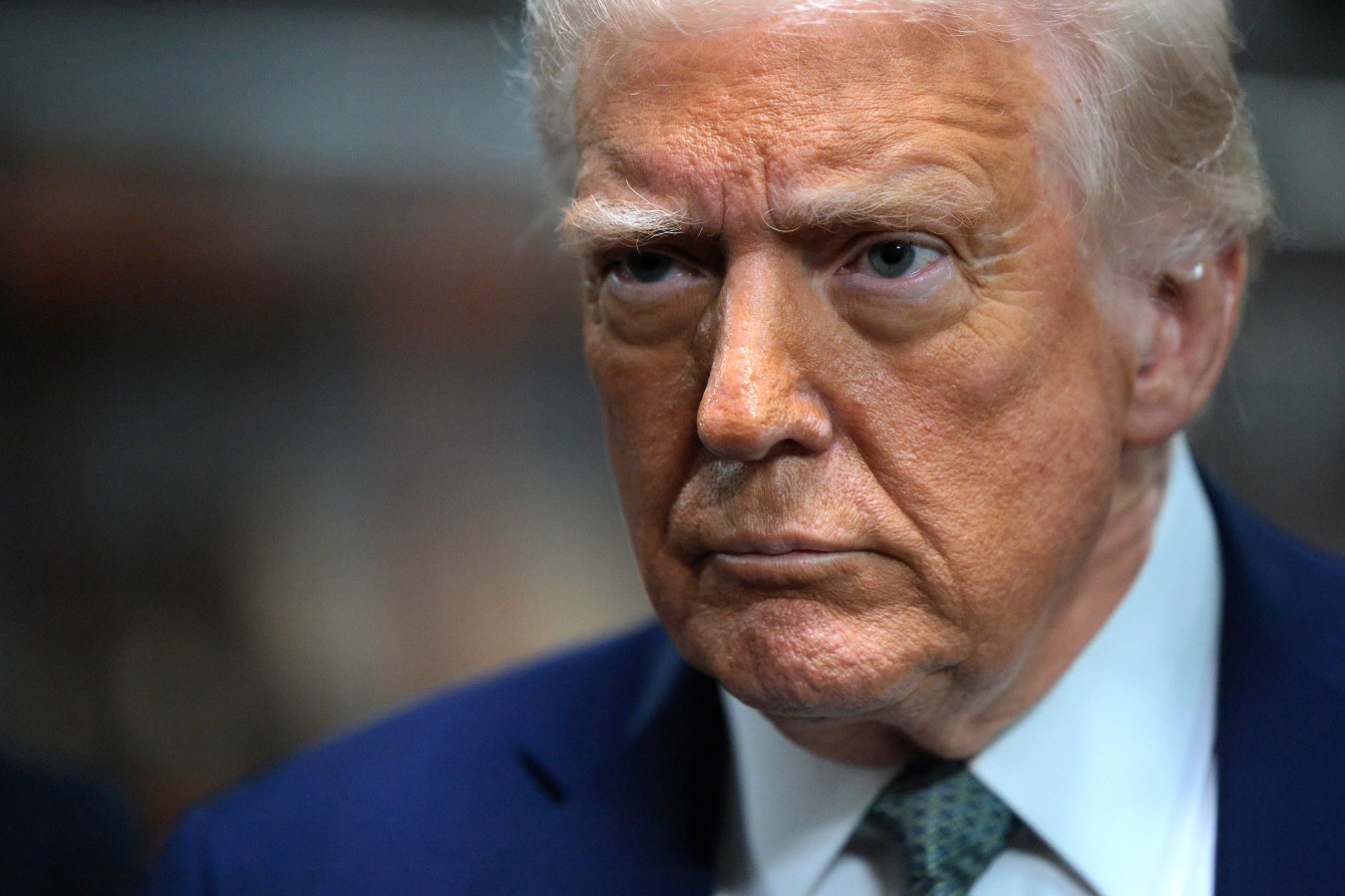The price tag for Apple’s iPhones may increase by more than 40% after President Donald Trump announced sweeping reciprocal tariffs on U.S. trade partners, analysts said Thursday.

Topline
Trump, in an address Wednesday, announced tariffs across several countries in Europe, Asia, Africa and the Pacific, with a baseline tariff of 10% (see a full list of countries impacted by tariffs). The new trade policies will likely increase prices across several imported goods, including new cars, coffee, chocolate and other products.
What goods could be impacted by Trump’s tariffs?
Prices will likely increase on products sold by U.S.-based companies as they pay taxes on imported foreign goods, though it’s not immediately clear which prices would be directly impacted or how each company would respond to tariffs.
- Analysts from Rosenblatt Securities said in a note Thursday that Apple would need to increase prices for several products to offset an estimated $39.5 billion in costs from tariffs as the company relies heavily on China-based manufacturing, including a 43% price increase for iPhones and Apple Watches, a 42% increase for iPads and a 39% hike for Airpods and Mac computers.
- Apple released a cheaper iPhone model in February with a $599 price tag, which would increase to about $856 after a 43% increase, while its pricier $1,599 iPhone 16 Pro Max would jump to $2,300.
- About 80% of the coffee beans imported into the U.S. come from Latin America, and most coffee imports come from Brazil (35%) and Colombia (27%) as of 2023, according to the Department of Agriculture, as both countries face tariff rates of 10%.
- Cocoa beans, used to produce chocolate products, are largely imported from Côte d’Ivoire, Ecuador and Ghana, which face tariff rates of 21% and 10%, respectively, while cocoa butter is mostly supplied by Indonesia and Malaysia, according to the USDA, as the countries face rates of 32% and 24%, respectively.
- The U.S. imports most of its olive oil from the European Union, with leading producers in Spain, Italy and Greece, though the U.S. has also sourced olive oil from Turkey and Argentina, according to the USDA. Turkey and Argentina were each levied with 10% tariffs.
- The U.S. accounts for roughly 30.4% of India’s annual gems and jewelry exports, industry officials told Reuters, as India handles nine out of every 10 diamonds processed globally.
- Sugar is largely imported into the U.S. from the Dominican Republic (17%), Brazil (14%) and the Philippines (13%), per the USDA’s estimates. The Dominican Republic and Brazil face 10% tariffs, while a 17% rate was levied on the Philippines.

- More than 60% of rice imports into the U.S. come from Thailand, India and Pakistan, the USDA said. Thailand and Pakistan face tariffs of 36% and 29%, respectively.
- The U.S. International Trade Commission estimates 37% of all footwear imports—an estimated $9.5 billion—to the U.S. in 2023 came from China, which Treasury Secretary Scott Bessent said Wednesday would be hit with a combined 54% tax.
- Mattel suggested in the company’s fourth-quarter earnings call the prices of its toys—including Barbie and Hot Wheels products—would be raised in response to tariffs on China, where Mattel sources about 40% of its goods. The Toy Association told Forbes about 80% of toys imported to the U.S. come from China.
- Wine produced across European Union nations will face a 20% tariff, as France and Italy were the top suppliers to the U.S. in 2021, though the United Kingdom, New Zealand, Argentina and Australia were also among the top wine importers, the USDA reported. Those countries each face a 10% tariff.
- Scotch whisky, produced across the United Kingdom, will also likely rise in price: The Scotch Whisky Association said in a statement the group was “disappointed” by the U.S. levying a 10% rate on the U.K.
- China was the largest exporter of clothing to the U.S. from 2013 to 2023, though Bangladesh, Cambodia, India, Indonesia and Pakistan were also among the top suppliers, according to the U.S. International Trade Commission. Those countries face tariffs of 37%, 49%, 26%, and 29%, respectively.

- The Home Furnishings Association previously estimated about 29% of furniture imported to the U.S. came from China, while about 26.5% of imports originated from Vietnam, which faces a 46% tariff.
- American consumers will likely pay an additional $2,000 to $5,000 for lower-end new cars produced in the U.S., with a possible $20,000 increase for some imported models, the Anderson Economic Group told Forbes in a statement. Trump previously announced a 25% tariff on all auto imports, while tariffs on auto parts start on May 3. Industry analysts estimate about 22% of all new vehicles sold in the U.S. are imported from Canada and Mexico.
- About 34.5% of all electronics—computers, TVs and accessories like keyboards, memory cards and hard drives, among others—and telecommunications equipment imported to the U.S. comes from China, while Malaysia, Taiwan, Vietnam, Japan, Germany and South Korea are also among the top exporters.
What Other Goods Could Be Impacted?
Under 25% tariffs previously announced for goods manufactured in Mexico and Canada, prices for some products may increase as more markets are impacted.
- Canada is the largest exporter of meat to the U.S., accounting for about $14 billion in goods in 2023. Other Canadian imports include beef, pork, grains, feeds and oilseeds, according to the USDA.
- The Canadian government previously warned tariffs could raise the prices of dairy products like milk, cheese and eggs, as well as winter coats, glassware and appliances like ovens, stoves and microwaves.

- About 88% of all avocado imports to the U.S. between 2019 and 2021 came from Mexico, and the U.S. imported about $45 billion in agricultural products from Mexico in 2023, including strawberries, raspberries and tomatoes, the USDA reported.
- Tequila accounts for roughly 10% of agricultural imports from Mexico, while 81% of all imported beer in the U.S.—accounting for 18% of total beer consumed—also comes from Mexico, where Pacifico, Corona and top-selling Modelo are brewed, according to estimates from the USDA and Commerce Department.
- Several Canadian trade groups and the Distilled Spirits Council of the U.S. warned the prices of bourbon, Tennessee whiskey and Canadian whisky would likely increase a a result of the tariffs.
Canada Hits U.S.-Made Vehicles With Retaliatory Tariffs
Canadian Prime Minister Mark Carney announced Thursday that Canada will match 25% tariffs on all vehicles imported from the U.S. not subject to the U.S.-Mexico-Canada trade agreement. The tariffs will not impact auto parts “because we know the benefits of our integrated production system,” Carney said, adding Canada is “developing a framework for auto producers to avoid our counter tariffs, as long as they maintain their production and investment in Canada.”
Surprising Fact
Stellantis will pause production at two assembly plants in Canada and Mexico in response to Trump’s auto tariffs, according to a company memo obtained by CNBC. About 900 U.S.-based employees will reportedly be temporarily laid off as a result. Stellantis relies on a Canadian plant to manufacture Chrysler Pacifica and Dodge Charger Daytona EV vehicles, while its Mexican facility produces the Jeep Compass SUV and Jeep Wagoneer.

Will Temu And Shein Be Impacted By Tariffs?
The Trump administration announced late Wednesday the “de minimis” trade provision, which allowed companies to send packages valued at $800 or less to the U.S. without paying duties or certain taxes, would be eliminated starting May 2.
Low-cost, fast-fashion retailers Temu and Shein have relied on the exemption for years, as the Biden administration cited “overuse and abuse” by the companies to alter the provision in 2024.
Haul, Amazon’s low-cost retailer that relies on third-party sellers and China, has also reportedly relied on the exemption. All goods that would previously qualify under the de minimis exemption will now be subject to additional charges of about 30% of their value or $25 per item, the White House said.
Contra
The White House argued late Wednesday the tariffs would not impact consumer prices, citing a statement from former Treasury Secretary Janet Yellen last year: “I don’t believe that American consumers will see any meaningful increase in the prices that they face.” The quote appears to cut a portion of an interview with Yellen, who later said tariffs were “very carefully targeted” at sectors already supported by the Biden administration.
Ford told Reuters the company will offer employee-rated discounts to all consumers starting Thursday. The company builds about 80% of the vehicles it sells in the U.S. domestically, though it’s unclear whether Ford will continue offering the discount as the automaker relies on production in Mexico and Canada.

Trump warned CEOs of some automakers not to raise their car prices in a phone call last month, the Wall Street Journal reported, and he later said he “couldn’t care less” if foreign automakers raise their prices in response to tariffs.
Key Background
During what Trump referred to as “Liberation Day” on Wednesday, the U.S. implemented reciprocal tariffs against more than 180 countries. Trump said each rate was roughly half of the total charges imposed on the U.S., arguing his approach was “kind.”
Details about the tariffs were largely unknown before Trump’s announcement, as the White House was “perfecting” the rates hours earlier, White House press secretary Karoline Leavitt said. Trump had floated a 20% universal tariff on all imported goods during his reelection campaign, and Bessent said last month tariffs would target the “dirty 15,” or the 15% of countries that account for most of the trade with the U.S.
Trump has already implemented a 25% tariff on all products from Canada and Mexico not subject to the U.S.-Mexico-Canada trade agreement, in addition to a 10% tariff on Chinese imports and a 25% tariff on all steel and aluminum imports.
This article was originally published on forbes.com.
Look back on the week that was with hand-picked articles from Australia and around the world. Sign up to the Forbes Australia newsletter here or become a member here.


